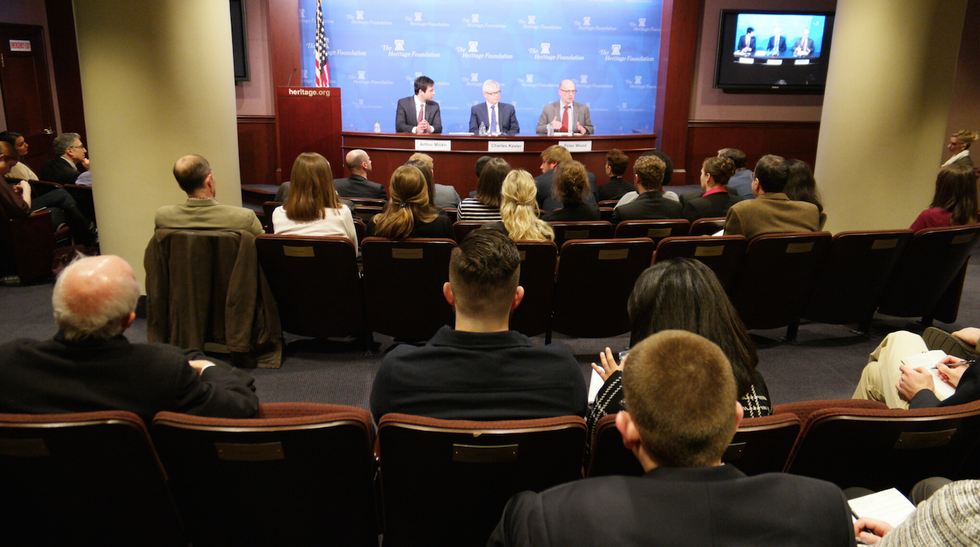
"Who Rules the Universities?" (Image Source: Courtesy of The Claremont Institute)

The Claremont Institute, in association with the Heritage Foundation and the National Association of Scholars, hosted an event titled, "Who Rules the Universities?" last week to discuss how recent waves of student protests on U.S. college campuses have continued to undermine and redefine the idea of "the university" itself.
The event, which was held at the Heritage Foundation's Lehrman Auditorium Feb. 26, featured two speakers: Claremont Review of Books Editor-in-Chief Dr. Charles Kesler, a senior fellow at the Claremont Institute and the Dengler-Dykema distinguished professor of government at Claremont McKenna College; and National Association of Scholars President Dr. Peter Wood. Arthur Milikh, assistant director of the Heritage Foundation’s B. Kenneth Simon Center for Principles and Politics, moderated the discussion of what the role of the "university" will become in a rapidly changing social sphere.

During his introduction, Milikh discussed the peaceful student protests that have emerged across college campuses in recent months that seem to value "diversity" over the "development of the intellect," adding that to "defend the university requires a self-justification and an understanding of its purpose."
"Liberal education aims to liberate the mind from prejudice — the prejudice of birth, public opinion, our own distorted and inflated opinions of ourselves — in preparation for citizenship and freedom," Milikh said. "But modern universities too often flatter and protect prejudices. It says there's almost nothing to learn. 'Come as you are, for you have already attained a kind of perfection,' they say. Gaining and preserving wisdom takes a backseat to the creation of 'safe spaces' — shelters, in other words — for prejudice, not from it."
When Kesler began his segment, he bemoaned the student protesters' failure to recognize the universal principles that "provide the starting points of demonstration or argument," adding that the idea of the "university" itself hinges upon the ability to grasp moral and physical values as "self-evident truths." If the protesters do not recognize these universal values, Kesler believes that they can never truly understand or appreciate the "university's" original intent.
Kesler also stated that the human mind is naturally "free" and "undetermined" and thus is not dependent upon class, race or gender to engage in the cultivation of the mind through the freedom of will exercised alongside political freedom. All scholars should see themselves as human beings with free minds seeking to understand the universe. When the protesters cry for limits on freedom and knowledge, Kesler inferred that they disrespected the pursuit of higher education.
Ultimately, Kesler criticized the student protesters for their backlash against "open discourse" and a "community of controversy" free from "safe spaces" and "trigger warnings" and "microagressions," adding that their desire to impose restraints upon freedom of speech and the pursuit of knowledge is only a demand to treat them as children — and not the scholars facing "adult challenges" that they purport to be.

When Wood spoke, he blamed "heedlessness" as the reason the idea of the "university" is under siege by student protesters and those who cater to their demands. Bashing a culture that "celebrates anger as a resource to be exploited," Wood lamented a "post-literacy" generation that has "no real understanding of this country's history." He also criticized the "opportunists" who take advantage of students' "vulnerabilities" to foster a "redefinition of higher education."
Emphasizing the three essential values of truth, culture and character to the pursuit of higher education, Wood lamented that the pursuit of knowledge is now "situational" because students and professors are afraid of learning and discussing "uncomfortable facts and opinions."
"How did we come to this moment? I'll repeat, preemptive surrender and negligence on the part of conservatives, combined with brilliant opportunism and steadfast commitment to the long march through the institutions on the part of the liberal left," Wood concluded. "The burning irony of today's popular campus movement is that it's built upon supplanting knowledge with ignorance, inquiry with activism, and freedom with conformity. We got here by forgetting that knowledge, inquiry and freedom are fragile attainments that always have their enemies, and rather than defending it against those enemies, we slept."
Watch the entire event below:
—
Follow Kathryn Blackhurst (@kablackhurst) on Twitter